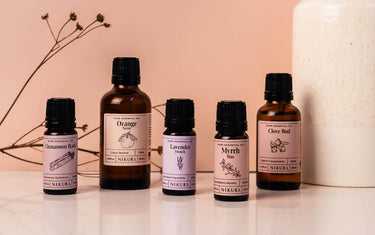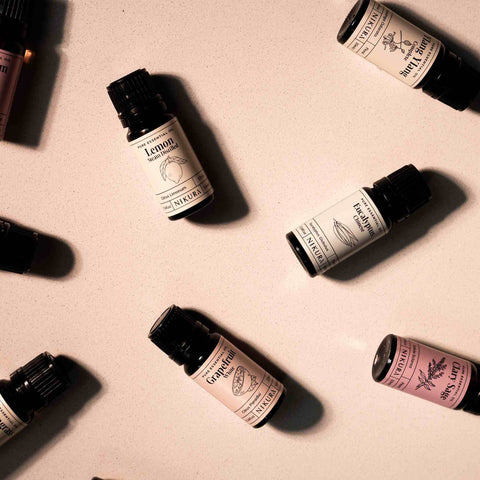7 min read / 12 November 2023 / yasmin sharp
Best Essential Oils for Diffusers
Unlock the scentsational world of aromatherapy with our expert picks.
Share this post

Finding the best essential oils for diffusers can be tricky, especially if you haven’t enjoyed your favourite scent using this method.
Many people prefer to use a diffuser in addition to applying essential oils topically, as aromatherapy can help to reduce stress and anxiety levels and create a general sense of calm.
We decided to take a closer look at the best essential oils for diffusers, so you can start your journey towards finding the perfect blend for your home.

Best essential oils for diffusers
Here are some of the best oils for diffusers, which we’ve separated into six different categories to make it easier to find the right one for you:
Floral Scent
Floral essential oils are mostly known for their calming properties.
Popular for their ability to give you a peaceful nights sleep, many people will add a few drops to their diffuser before winding down for bed.
Great floral oils to help you drift off include:
Citrus scent
Citrus essential oils have a bright, fruity scent. Many people diffuse these types of oils to refresh and re-energise themselves and the space around them.
Popular citrus oils include:
- Lemon essential oil
- Sweet orange essential oil
- Bitter orange essential oil
- Bergamot essential oil
- Tangerine essential oil
- Lime essential oil
When added to a diffuser or oil burner, most of these oils disperse a sweet, tangy scent that can lift and transform your emotions and thoughts.
Earthy scent
For a more grounded, centred scent, essential oils offer a slice of nature in your own home and can be great for dealing with stress and other unwanted emotional states.
Recommended earthy essential oils include:
- Amyris essential oil
- Benzoin essential oil
- Patchouli essential oil
- Myrrh essential oil
- Vetiver essential oil
As well as helping you to relax and unwind, most earthy essential oils are great for the skin, offering different benefits that can revitalise and rejuvenate its appearance.

Spicy scent
Many people enjoy the warm, inviting scent of spicy essential oils, as they produce a strong aroma that feels calming and welcoming.
Spicy oils often used in diffusers include:
- Aniseed essential oil
- Cinnamon essential oil
- Clove bud essential oil
- Black pepper essential oil
- Pink pepper essential oil
- Nutmeg essential oil
These essential oils are often used to combat colds and infections, with some also being festive favourites that help to evoke positive feelings and memories that support good mental health.
Herbal scent
If you prefer scents that are slightly more refreshing, then these are some of the best essential oils for diffuser burning.
This group of oils can include:
- Sage essential oil
- Basil essential oil
- Marjoram essential oil
- Coriander seed essential oil
- Bay leaf essential oil
- Rosemary essential oil
Whilst all of these scents are closely associated with cooking recipes, these are strong fragrances that are used by many people to create a calmer, serene mood.
Woody scent
Woody essential oils are deep and natural and are sourced from roots, trees and plants from around the world.
They are rich and nurturing in tone and ideal for use in diffusers at home:
- Black spruce essential oil
- Maritime pine essential oil
- Cedarwood essential oil
- Rosewood essential oil
- Pine needle essential oil
- Juniper berry essential oil
- Cypress essential oil
Minty scent
Minty essential oils are something of a combination of scents, smelling natural and herby, whilst also being as uplifting and refreshing as citrus-based oils:
Diffusing these types of essential oils can create an uplifting, energising effect, that is often associated with fresh, cleansing scents.

How to create your own essential oil blend
Creating your own essential oil blend is a rewarding process that allows you to customise scents for your specific needs.
- Start by selecting a base oil, such as jojoba or sweet almond.
- Choose essential oils based on their intended purpose - like lavender for relaxation or peppermint for energy - balancing top, middle, and base notes.
- A common starting ratio is 3:2:1, using three drops of a top note, two drops of a middle note, and one drop of a base note.
- Blend the oils in a glass container, adjusting the ratios to achieve your desired scent.
Find out more on how to create your own essential oil blend in our comprehensive guide.
Enjoy your personalised blend in a diffuser or as a personal fragrance, and feel free to experiment with different combinations to discover new scents that resonate with you.
Benefits of using pure essential oils for diffusers
Some of the benefits of using essential oils in diffusers include their ability to:
1. Promote better relaxation
Aromatherapy is popular with many people who need a little help dealing with stress and anxiety, or simply relaxing after a long day.
You can diffuse the oil as you carry out your usual activities, or you enjoy the fragrance as it slowly envelops you when you are watching TV, reading a book or taking some time out.
2. Work as a mood booster
Practising self care is important, especially if you are experiencing depression or a low mood.
Using an essential oil with a diffuser can help to lift your mood, whilst also giving you an energy boost.
It can make all the difference to your day, especially if your emotional state is preventing you from completing important tasks.
3. Relieve aching joints
Some essential oils contain properties that can help to ease joint pain.
Aromatherapy can also play a role in changing your psychological perception of any joint pain you may be experiencing, which can make it easier to deal with.
Some oils also encourage better sleep, which may support better joint health as your body recovers and regenerates as you rest.
4. Support better breathing
Diffusing essential oils can have a positive impact on the factors that are affecting your breathing, such as allergies, colds and coughs.
Adding a few drops to a diffuser can help to open your airways and make it easier to breathe. First time users should only use the diffuser for short periods to see if it has any adverse effects, before slowly extending the burn time.
5. Reduce skin inflammation and redness
Skin inflammation and redness can occur for many reasons, and diffusing certain essential oils can help certain mild conditions.
The properties of some oils can also improve the condition of your skin, making it look and feel fresher and revitalised.
It is a good idea to complete a patch test before diffusing an oil for the first time, as it can cause sensitivity or allergy issues for some people.

How much oil should I put in a diffuser?
When you find an essential oil you would like to try in a diffuser, you’ll need to know how much to add.
Most manufacturers will recommend that you add 5-10 drops of the oil. If you are using more than one oil, then 2-3 drops of each type should help you create a nice blend.
However, after using the diffuser for the first time you may want to increase or decrease the amount of oil you use, depending on your preferences.
Bear in mind, that less is usually more when it comes to essential oils and if you can no longer smell the aroma during diffusion, you may be experiencing olfactory fatigue, which means the oil is still being inhaled into your lungs, even if you cannot sense it.
Where the diffuser is located in your home will also affect how much oil you add. For example, 5-10 drops tend to work better in smaller spaces, whilst 10-20 drops may be needed for larger rooms due to the increased dimensions.
If you are unsure about how much to use, most manufacturers will also provide instructions and recommendations based on the type of diffuser model you have purchased.
How to safely diffuse essential oils at home
There are some important diffuser safety tips to be aware of that can help you get more from your essential oils. Try to keep the following in mind:
- Be aware of essential oil safety: Before diffusing essential oils for diffusers, it’s a good idea to familiarise yourself with general essential oil safety principles. This includes things like conducting a patch test, dilution ratios and potential allergy and hazard issues that can occur and how to avoid them.
- Monitor diffusion times: Whilst it may be tempting to diffuse an essential oil for extended periods, intermittent diffusion is generally considered to be safer. Following a rule of 30-60 minutes and 30-60 minutes off helps to protect the body and reduces the risk of potential health issues.
- Follow diffuser instructions: There are many different types of diffusers, including electric, oil and reed diffusers, which each work in their own way. Manufacturers may also provide specific instructions that are relevant only to a particular model, so make sure you are aware of any particulars that affect the way the diffuser is used.
- Create good ventilation: This is relevant to spaces of any size, although it is especially important for smaller, compact rooms and areas. Essential oils are highly concentrated and can feel overwhelming even if diffused for short periods. Open windows, vents or doors if necessary to keep the space well ventilated.
- Take care around your pets: Cats, dogs and other pets can find it difficult to live around essential oils. Even smelling an oil can cause health complications, so take extra care around your pets when diffusing. Keep them out of the room during use, and only let them return once the space has been fully ventilated.

Whether you are using essential oils for electric diffusers, reed diffusers, oil burners or any other type of diffuser, there are no shortage of options for you to try.
It may initially require some trial and error as you test out different scents, but as there are so many to choose from, it shouldn’t prove too difficult to find what works for you.
Ultimately, selecting the best essential oil for diffusers comes down to your personal preferences, and as long as you follow the safety guidelines, it can make a huge difference to your home life.
Sign up for a wholesale account today for savings on our full range of essential oils!










